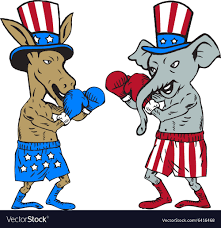by Charles R. Kesler,
from Imprimus,
9/27/18:
Six years ago I wrote a book about Barack Obama in which I predicted that modern American liberalism, under pressures both fiscal and philosophical, would either go out of business or be forced to radicalize. If it chose the latter, I predicted, it could radicalize along two lines: towards socialism or towards an increasingly post-modern form of leadership. Today it is doing both.

As we saw in Bernie Sanders’ campaign, the youngest generation of liberals is embracing socialism openly—something that would have been unheard of during the Cold War. At the same time, identity politics is on the ascendant, with its quasi-Nietzschean faith in race, sex, and power as the keys to being and meaning. In the #MeToo movement, for example—as we saw recently in Justice Kavanaugh’s confirmation battle—the credo is, “Believe the woman.” In other words, truth will emerge not from an adversarial process weighing evidence and testimony before the bar of reason, but from yielding to the will of the more politically correct. “Her truth” is stronger than any objective or disinterested truth.
 In the Claremont Review of Books, we have described our current political scene as a cold civil war. A cold civil war is better than a hot civil war, but it is not a good situation for a country to be in. Underlying our cold civil war is the fact that America is torn increasingly between two rival constitutions, two cultures, two ways of life.
In the Claremont Review of Books, we have described our current political scene as a cold civil war. A cold civil war is better than a hot civil war, but it is not a good situation for a country to be in. Underlying our cold civil war is the fact that America is torn increasingly between two rival constitutions, two cultures, two ways of life.
I fear America may be leaving the world of normal politics and entering the dangerous world of regime politics—a politics in which our political loyalties diverge more and more, as they did in the 1850s, between two contrary visions of the country.
 One vision is based on the original Constitution as amended.
One vision is based on the original Constitution as amended.
The other vision is based on what Progressives and liberals, for 100 years now, have called “the living Constitution.” This term implies that the original Constitution is dead—or at least on life support—and that in order to remain relevant to our national life, the original Constitution must be infused with new meaning and new ends and therefore with new duties, rights, and powers.
If one thinks about how America’s cold civil war could be resolved, there seem to be only five possibilities. One would be to change the political subject. ... if some jarring event intervenes—a major war or a huge natural calamity—it might reset our politics.
A second possibility, if we can’t change the subject, is that we could change our minds. Only two presidents in the twentieth century were able to effect enduring changes in American public opinion and voting patterns—Franklin Roosevelt and Ronald Reagan.
So if we won’t change our minds, and if we can’t change the subject, we are left with only three other ways out of the cold civil war. The happiest of the three would be a vastly reinvigorated federalism. If we had a re-flowering of federalism, some of the differences between blue states and red states could be handled discreetly by the states themselves. The most disruptive issues could be denationalized.
That leaves two possibilities.
 One, alas, is secession, which is a danger to any federal system—something about which James Madison wrote at great length in The Federalist Papers. And George Washington’s admonitions to preserve the Union, I think, still miraculously somehow linger in our ears.
One, alas, is secession, which is a danger to any federal system—something about which James Madison wrote at great length in The Federalist Papers. And George Washington’s admonitions to preserve the Union, I think, still miraculously somehow linger in our ears.
So secession would be extremely difficult for many reasons, not the least of which is that it could lead, as we Americans know from experience, to the fifth and worst possibility: hot civil war.
Under present circumstances, the American constitutional future seems to be approaching some kind of crisis—a crisis of the two Constitutions. Let us pray that we and our countrymen will find a way to reason together and to compromise, allowing us to avoid the worst of these dire scenarios—that we will find, that is, the better angels of our nature.

More From Imprimus:

















